- Home
- Richard Lee Byers
Arkham Horror- Ire of the Void Page 7
Arkham Horror- Ire of the Void Read online
Page 7
Unfortunately, Norman could not see the entire cell any more than Stane had been able to. He gave the door a thump from this side thinking that might provoke the Hound into revealing itself if it was still present. There was no reaction.
Probably he should let it go at that, but his very dread impelled him to make absolutely certain the creature had departed. He took a breath, slid back the deadbolt latch, and eased open the door, ready to yank it closed again at any sign of danger.
The Hound was gone. As was Stane, and, as far as Norman could see, every drop of spilled blood. Only the madman’s hood remained, the scarlet cloth now smeared with bluish sludge. Two more streaks of the same jelly lead to the far left corner.
14
Norman prowled through the shadowy, sparsely furnished house with its molding softening every corner and its shutters holding in its secrets. The air was as stale and dusty as before. Now that the Hound had taken its prey and gone, the only sounds were the soft ticking of a clock somewhere and the creak of floorboards under his feet.
He did not want to linger here but had resolved to stay in order to search for the documents Stane had mentioned. He had learned a good deal since his arrival—albeit, none of it encouraging—but he still did not know how to reach Tindalos, if that was really the name for the realm of the Hounds. Although the crooked man had claimed otherwise, perhaps his research held the answer.
To Norman’s disappointment, the library on the first floor contained only mundane material, volumes by Twain, Melville, Hawthorne, and Scott, business ledgers, and the 1911 edition of the Encyclopedia Britannica. But when he explored the upper reaches of the mansion, he found that Stane had transformed one of the three small gabled rooms into a more idiosyncratic place for study.
More painted sigils and hieroglyphs adorned the walls, and grotesque little carvings, one a jade figurine of a seated figure with a betentacled head, reposed on the curved shelving along with an assortment of books. To Norman’s surprise, some were the works of men like Plato, Aristotle, Bentham, and Kant along with commentaries hereon. Books on philosophy, with an emphasis on ethics. They pointed to a time when Jonathon Hobart Stane had pondered the question of how to live a moral life, and the depraved murderer he had become had evidently believed the musings of conventional philosophers had at least a little bearing on the esoteric matters that preoccupied him later on.
Norman closed the door. He did not want any open rectangular spaces, either, not in this house. Then, guided by Stane’s references to the ancients, he scanned the shelves for especially old-looking books.
There was only one, bound in cracked and crumbling blue leather. Apparently Stane had somehow managed to consult other tomes without acquiring them for his personal collection.
Careful not to damage the book more than time had already, Norman opened it. Faded and difficult to make out against the brittle and blotchy-brown title page, woodblock printing in blue ink proclaimed this was the Livre d’Eibon.
Norman started looking through it and discovered a consistent patter of two printed pages followed by two blanks. For all he knew, that had some arcane significance, but he suspected it was an artifact of the archaic production process.
The book also interspersed blocks of text with diagrams and glyphs like the ones in the cell and on the walls of this room, evidence, if more were needed, that it truly did contain information concerning the Hounds.
Near the end was a different sort of drawing. Dots radiating lines—representing stars, perhaps?—hung in a void, and a clawed, six-fingered hand reached as though to pick them like berries or perhaps simply crush them from existence.
Norman stared at the page in stupefaction. He had determined that, bizarre as it seemed, Stane’s ancients truly had comprehended space-time, and the entities that prowled its hidden pathways like game trails in a jungle, in a way modern scientists did not. Was it possible they had also known something about the heavens that shed light on his own astronomical conundrum?
With an effort of will, he forced himself to stop staring. The crude picture could mean anything, and there would be time enough to investigate it further if he survived his present course of action. For now, his priority was using what he had found to go after Schmidt.
Assuming he could. The text appeared to be in French, possibly medieval French. Whatever it was, Norman could not read it.
Perhaps he could prevail on one of his colleagues at Miskatonic—maybe Professor Rice from Classical Languages—to translate. But he would not be able to convince the man that time was of the essence. He would only sound crazy if he tried.
A half-dozen identical, slim, black-bound journals sat on the shelf between the spot the Livre d’Eibon had occupied and a soapstone carving of a man in a pharaoh’s headdress with an expression of sly mockery on his face. Norman opened the first of the books, beheld the initial words handwritten therein, and exclaimed in satisfaction.
Stane had taken notes as he made his studies—notes in English. Norman flipped through the volumes in turn.
It appeared that, as he had more or less indicated to Norman, the madman had consulted four books of esoteric wisdom: the Livre d’Eibon; the Pnakotic Manuscripts; Cultes des Goules by Francois-Honore Balfour, Comte d’Erlette; and De Vermiis Mysteriis by Ludwig Prinn. From each, Stane had gleaned something of the nature of the Hounds of Tindalos. Some of it, he had already relayed to Norman. Other bits were new, including the revelation that the creatures possessed allies: the “Dholes”—whatever they were—and satyrs.
Could the latter possibly be correct? Norman imagined the goat men from classical mythology, as depicted in ancient paintings and sculptures, and decided it was unlikely the Hounds made common cause with anything that close to being human. The term as employed here almost certainly applied to entities more alien and malign.
After a second, he surprised himself by laughing. It may have been an inappropriate response, possibly even a warning sign of an impending breakdown, but he was already in so far over his head that, at this moment, the discovery that he might have to contend with other monsters in addition to the Hounds seemed more comical than alarming.
He continued skimming. In the fifth volume was the incantation for “lighting the beacon” to call the Hounds. And in the sixth, another spell, likewise rendered phonetically, for “splitting the angle” and walking through time in the flesh.
Of course, the spell could be nonsense. Norman’s understanding of science insisted it had to be. But after what he had experienced in the cell, he could only believe that somehow, in some fashion, magical conjurations sometimes did what they were alleged to, and in all likelihood this was one of them.
If so, he supposed he should be glad that, against all odds, he had accomplished a crucial step on the way to his ultimate goal. Yet he felt cold with the knowledge that now it was actually possible to follow through on his resolve.
Part Three
Tindalos
15
Norman had never frequented Arkham’s speakeasies—or “juice joints,” to use Schmidt’s parlance—but other faculty and students at Miskatonic had a propensity for doing so. Over time, as if by osmosis, Norman had absorbed a little information about them. Supposedly there were a couple with some pretensions to “class.” The Nightingale Club in Uptown was one, and the Tick Tock Club in the Merchant District was another.
Located outside the city limits on the highway to Boston, Hibb’s Roadhouse affected no such airs. Sawdust covered the floor, the walls were made of bare planks, and the place shook when a train clattered past on the tracks nearby. The air stank of beer and the sweat of the factory workers and farmers who had crowded in to do their drinking. Some of those regulars eyed Norman curiously as he made his way through the press.
He wondered why, as a phone call to Doyle Jeffries had revealed, Old Sadie Sheldon frequented Hibb’s and not some fancier establishment. Maybe the bootlegger was a silent partner in the roadhouse. Or perhaps roosting here was a wa
y of proclaiming that, born and raised on a little farm outside Dunwich, he still retained the common touch.
If it was the latter, Sheldon was only willing to put up with so much to foster that image. Despite the general crush, the bootlegger and five associates had the back of the room to themselves with the adjacent tables vacant. A big man in a sack suit intercepted Norman as he approached.
“You can drink at the bar,” the hoodlum said. He waved his hand in that direction.
“Thank you,” Norman replied, “but I came to speak with Mr. Sheldon.”
Eyes narrowing, the big man looked him over a second time. Norman got the distinct impression that people with a scholarly air about them did not seek out Old Sadie Sheldon very often. “And who are you?”
“Norman Withers. The person who told the police about the barn full of whiskey outside of town.”
“Damn,” the hoodlum said. “Wait here.” He went to the table, talked back and forth with his boss for a moment, and then waved Norman forward.
Old Sadie Sheldon was a small man with a high forehead over dark, deep-set eyes in nests of wrinkles. He still projected a gamecock toughness despite his advancing years. He wore his steel-gray thinning hair brushed straight back and slicked down with brilliantine.
Like his subordinate, he took his time looking Norman over. At length he said, “After people interfere in my business, they mostly go out of their way to avoid me.”
Norman put his hand on the back of an empty chair. “May I sit?”
Sheldon snorted. “Sure, why not?”
Norman took a seat while Sheldon continued to grin silently.
“Like I was saying, normally, if you’d found the brown and run to the cops, I’d be annoyed. Hell, maybe I am. I haven’t decided yet. But I understand there was more to it. You had a friend go missing. One of my boys went missing too, same place, same night, although from what I understand, you and the German never saw him.”
“That’s what my statement said,” Norman answered, “but it’s not true. Professor Schmidt and I did run into him.”
The gangsters at the table tensed. “Then tell us what happened to him.”
Norman sighed. “You wouldn’t believe it so it would only get in our way. Suffice it to say, I regret that your associate is probably dead. Not by Professor Schmidt’s hand or mine, I assure you. But if he’s alive and I can restore him to you, I will.”
“What is this shit?” Sheldon snarled. “What are you beating your gums about?”
“I know it’s frustrating. This is difficult to discuss, and I’m handling it awkwardly. I apologize.”
“To hell with you apologize! Do you think that because we’re meeting in a public place, you can play games with me? I can come pay you a visit anytime I want!”
Norman waved his hand. “Obviously. But there’s no reason it should come to that if we conduct ourselves like reasonable men.”
Sheldon glared for another moment, and then his gaze softened. “You’re not even a little bit afraid of me, are you?” he asked.
With a twinge of surprise, Norman realized it was so.
He had no illusions that he had transformed into a courageous man. The terror he had felt in the presence of the Hounds and the recurring stabs of dread that afflicted him afterward sufficed to disabuse him of any such notion. Yet his recent experiences had transposed fear up an octave into the register of the otherworldly. Ordinary human beings, even hardened criminals, were no longer striking the proper notes.
“I’m not,” he said. “Sorry.”
Sheldon laughed. “What are you doing here if not to tell me what happened to Frankie—my fella standing guard?”
“I need some things. Perhaps I could buy them myself, but not without people who already have their suspicions about me wondering why. I imagine a man in your position could obtain them discreetly.” He extracted a piece of notepaper from his breast pocket and handed it over.
Sheldon’s eyes widened as he read the list. “Hell, Professor, haven’t you heard? The war’s over. They signed the Armistice back in ’18.”
“I still need them, I’ll never tell anyone where I got them. And, of course, I expect to pay for them.” Norman removed an envelope from his jacket’s inner pocket and handed it across the table.
Sheldon riffled through the bills. “Teaching college must pay pretty good.”
“After my wife—my ex-wife—remarried, I didn’t owe alimony anymore, and I worked such long hours that I didn’t have the chance to spend much money. My pay just accumulated in the bank. It’s all yours if you help me.”
Frowning, his eyes narrowed, Sheldon pondered through three sips of whiskey. Then he said, “I probably shouldn’t. But scratch is scratch, and I’m curious to see if you’ll show up in the Advertiser doing something crazy.”
“With luck, the Advertiser will never find out about it. I do have one condition before we make a deal.”
“Oh, yeah? What’s that?”
“Someone will need to show me how to use the items.” Norman smiled. “I am just a college teacher, after all.”
16
The Prohibition Agents had smashed all the whiskey crates and the bottles within, filling the old barn with the lingering smell of whiskey. After that, they had had no reason to remain. No one challenged Norman when he entered, set his fused bundle of dynamite in the corner where Schmidt had vanished, and then stood facing the juncture of the two walls with Stane’s copied incantation in hand. He assumed that if any pathway would take him to the physicist, it was the one that ran from here.
He felt ridiculous with the M1921 Thompson submachine gun and its ammunition, like a little boy playing soldier. Or an aging pack mule weighted down with too much baggage. Yet in a way, the absurdity was welcome. It provided a distraction from the fear.
He had twice survived the Hounds’ attentions by running away. It was surreal that he, a mild-mannered academic his whole life through, now proposed to venture toward them. Indeed, to invade their home territory.
Certainly, he had little faith that his new weapon would actually enable him to survive. Stane had said it likely would not. Still, if it could improve his chances even marginally, it was worth having.
Of course, that was assuming the Hounds even got the chance to accost him. For all he knew, he was about to step into a place without oxygen, or where blazing heat or unbearable cold would destroy him in an instant. Stane’s notes claimed that the same incantation that opened the way protected a traveler from adverse conditions, but Norman wondered how far he could trust that given that the madman had surely never made the journey himself. Stane had done his homicidal best to stay clear of the Hounds except under the safest conditions he could devise.
All in all, Norman would be taking a colossal risk when it did seem all but certain Schmidt was dead. Yet despite all the factors that might have deterred a wiser man, he realized he was going through with it.
He owed it to Schmidt to attempt a rescue so long as there was even the slimmest hope, and the scientist in him wanted to see what lay beyond the human world, even if that meant plunging into horror. To deny those instincts would diminish him, possibly shrivel him back into something he no longer cared to be.
Or maybe it was simply that decisions and events generated momentum, and now that he had come this far, turning back would be the greatest absurdity of all. Whatever his motives, he supposed he should stop pondering them and get on with the task at hand before his nerve failed him.
Norman started reading from the paper. He had rehearesed by practicing this a sentence at a time, out of sequence, to minimize the chances of botching the recitation or casting the spell prematurely. Stane’s notes suggested that could be dangerous, although he was vague about the specific consequences.
The yipping, rasping words strained his throat, but as best he could judge, they came out properly, and as he declaimed the final sentence, the world changed. Although the corner he was facing looked no different, it felt n
ot just open but profoundly so. As if a door had swung open on a vast desert or a gulf as deep and broad as the Grand Canyon.
The sensation made the hairs on the back of his neck stand on end, but at least he did not feel the attention of a Hound lurking beyond the threshold. He took a breath, walked gingerly forward, and this time penetrated the point where two walls came together with a light sensation like the strands of a bead curtain brushing over his body.
17
Beyond the corner, twilight waited. Taking a first look around, Norman found himself on a white path that zigzagged forward over gray emptiness without any form of visible support. The way was ten feet wide and broad enough that someone who kept to the center need not fear falling over the side. Even so, the drop-off into what appeared to be infinite depths made him feel dizzy and sick.
He took a breath and then a small experimental step that felt no different than walking on a sidewalk. Turning, he discovered that he stood on the end of the path and that the very end was shaped like a right-angle notch. He reached beyond it and felt the bead-curtain sensation on his fingers. They disappeared, presumably back into the barn, and reappeared when he retracted his arm.
So everything was all right so far. Either because somehow there was naturally air here, or through the intercession of the spell he had cast, he could breathe. The temperature was cool but not cold. There was light to see by. Gravity and friction made ambulation possible even though he could discern no planetary body beneath him. The path looked smooth as glass, and the way back to the human world was open.
All in all, conditions were as favorable as he had any right to expect. Still, he needed three more deep steadying breaths before he could impel himself farther down the path.
As he neared the first jag, the vast space around him stirred and seethed. Sure the Hounds or their allies were converging on him, he let out a choked little cry.

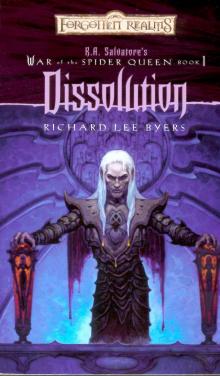 Dissolution
Dissolution Arkham Horror- Ire of the Void
Arkham Horror- Ire of the Void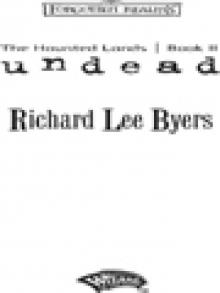 The Haunted Lands: Book II - Undead
The Haunted Lands: Book II - Undead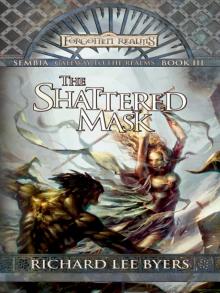 The Shattered Mask
The Shattered Mask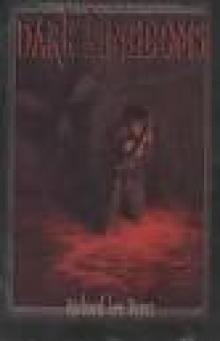 Dark Kingdoms
Dark Kingdoms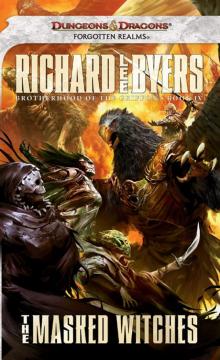 The Masked Witches: Brotherhood of the Griffon, Book IV
The Masked Witches: Brotherhood of the Griffon, Book IV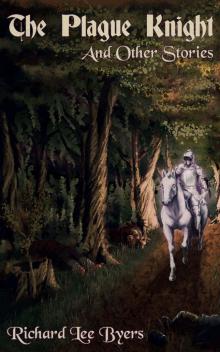 The Plague Knight and Other Stories
The Plague Knight and Other Stories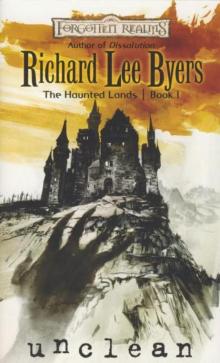 Unclean: The Haunted Lands
Unclean: The Haunted Lands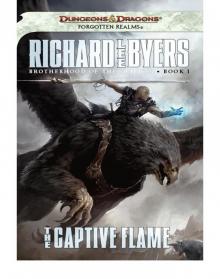 The Captive Flame: Brotherhood of the Griffon • Book 1
The Captive Flame: Brotherhood of the Griffon • Book 1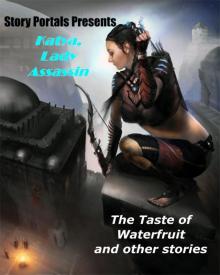 The Taste of Waterfruit and Other Stories (Story Portals)
The Taste of Waterfruit and Other Stories (Story Portals)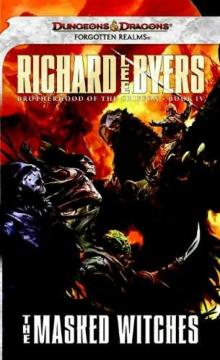 The masked witches botg-4
The masked witches botg-4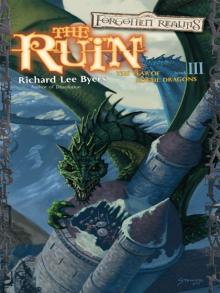 The Ruin
The Ruin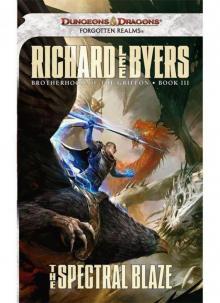 The Spectral Blaze botg-3
The Spectral Blaze botg-3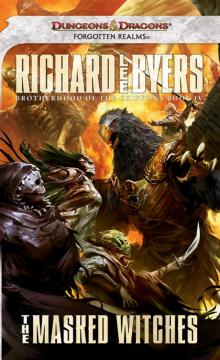 The Masked Witches
The Masked Witches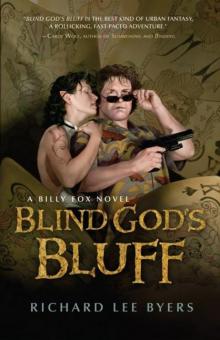 Blind God's bluff bf-1
Blind God's bluff bf-1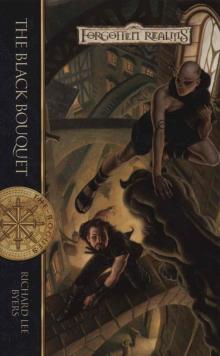 The Black Bouquet r-2
The Black Bouquet r-2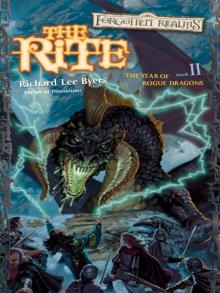 The Rite
The Rite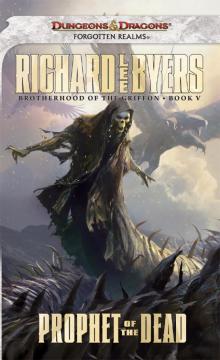 Prophet of the Dead: Forgotten Realms
Prophet of the Dead: Forgotten Realms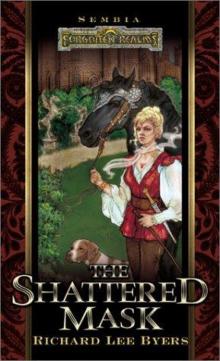 The Shattered Mask s-3
The Shattered Mask s-3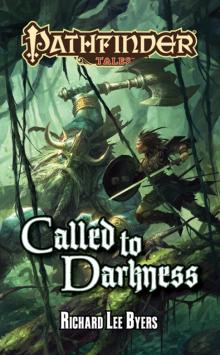 Called to Darkness
Called to Darkness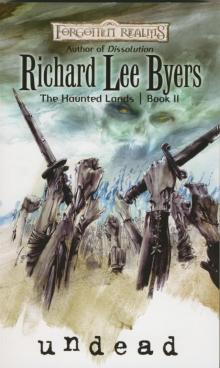 Undead hl-2
Undead hl-2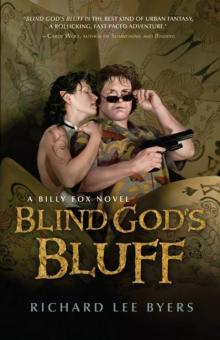 Blind God's Bluff: A Billy Fox Novel
Blind God's Bluff: A Billy Fox Novel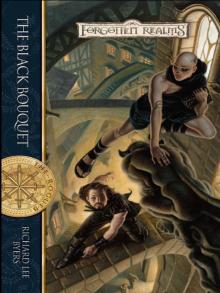 The Black Bouquet
The Black Bouquet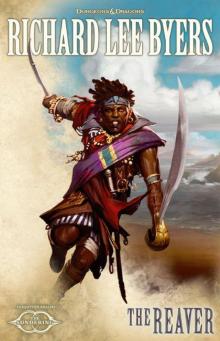 The Reaver
The Reaver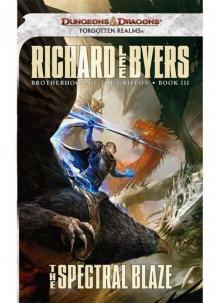 The Spectral Blaze: A Forgotten Realms Novel
The Spectral Blaze: A Forgotten Realms Novel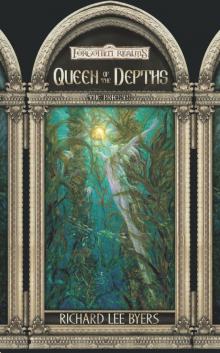 Queen of the Depths
Queen of the Depths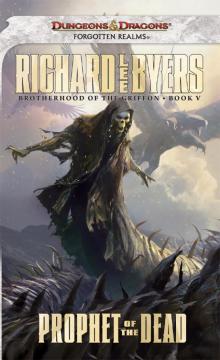 Prophet of the Dead botg-5
Prophet of the Dead botg-5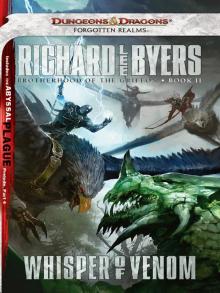 Whisper of Venom: Brotherhood of the Griffon, Book II
Whisper of Venom: Brotherhood of the Griffon, Book II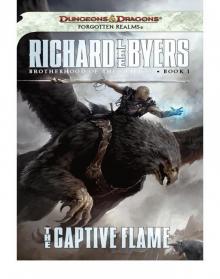 The Captive Flame botg-1
The Captive Flame botg-1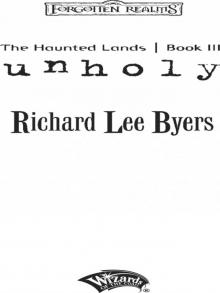 The Haunted Lands: Book III - Unholy
The Haunted Lands: Book III - Unholy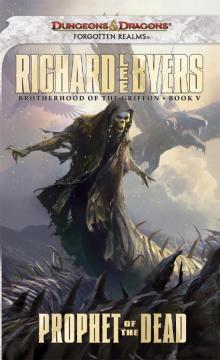 Prophet of the Dead
Prophet of the Dead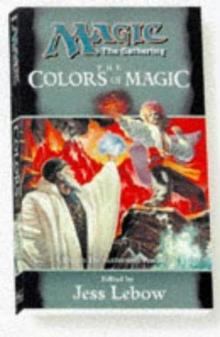 The Colors of Magic Anthology (magic: the gathering)
The Colors of Magic Anthology (magic: the gathering)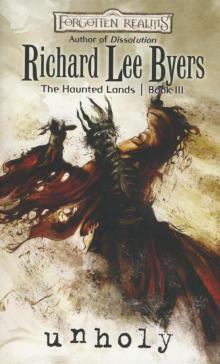 Unholy hl-3
Unholy hl-3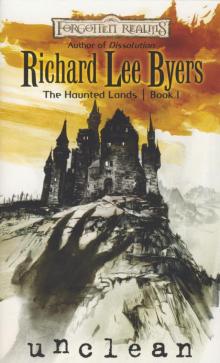 Unclean hl-1
Unclean hl-1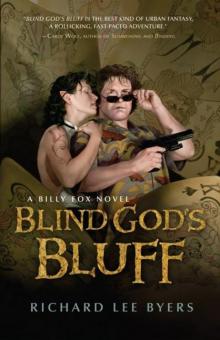 Blind God's Bluff
Blind God's Bluff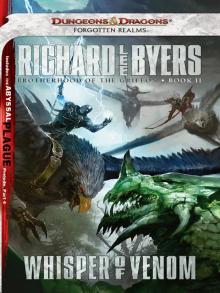 Whisper of Venom botg-2
Whisper of Venom botg-2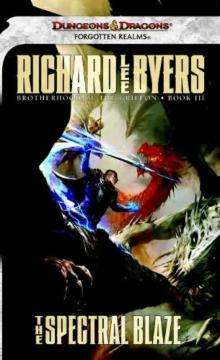 The Spectral Blaze
The Spectral Blaze